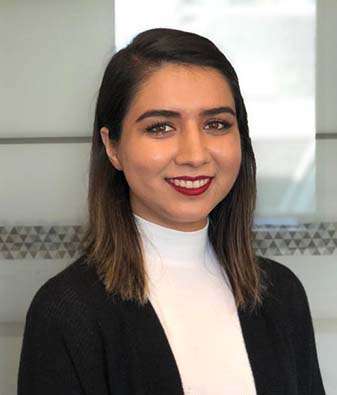April 27, 2022 | Research
At the Muslims in Canada Archives, Moska Rokay helps fill a critical gap in the national narrative
By Josslyn Johnstone

Moska Rokay (BA 2016 UC, MI 2019) loves connecting the surprising dots between the life stories she hears when speaking with Canadian Muslims across the country. As archivist for the Muslims in Canada Archives (MiCA) project at the Institute of Islamic Studies (IIS), collecting records from donors is a process of not only preservation — but discovery.
“For instance, many people I have spoken to recall attending a co-ed Muslim youth summer camp in the 1980s and 90s, pre 9/11,” explains Rokay. “It’s been fascinating to speak to so many different people who each have fond memories of this time, like playing sports, learning how to canoe, doing arts and crafts, and, of course, participating in lectures on Islam.”

While the camp has changed names and locations over the years, it exists now as Camp Deen. The shared memories built there will continue to live on through the photographs, postcards and other keepsakes that Rokay continues to gather for MiCA.
As part of the archive, these types of meaningful stories are helping to write Canadian Muslims into the broader historical narrative of the country, according to IIS Director Anver Emon.
Muslims have been in Canada since Confederation, but their stories are not robustly told anywhere.
“Muslims have been in Canada since Confederation, but their stories are not robustly told anywhere,” says Emon, who is also a professor in the Faculty of Law and Department of History in the Faculty of Arts & Science, and Canada Research Chair in Islamic Law and History. “Not much is known about the early history of Muslims in Canada, or the current history they make each day alongside other communities.”
The archive is also helping to recalibrate present-day conversations about Islam and Muslims. Explains Emon, “Canadian Muslims have too often been subject to stereotypes, prejudice, and creeping Islamophobia. These biased representations will not go away overnight, which is where MiCA comes in — by speaking back to an Islamophobic narrative, one story at a time.”
Sadia Zaman, CEO of the Inspirit Foundation and one of MiCA’s partners, says that collaborating with organizations from different sectors is important because the dominant narrative in public discourse is very powerful: “It requires us all to work together to create a different one.”
“The participatory nature of this archive is crucial to help tell the complex, multifaceted and nuanced story of Muslim presence in Canada,” she says. “And its academic rigour is needed to help build the foundation for those stories so that they can be disseminated and made accessible.”
Being Muslim is often associated with a national security and threat narrative that dehumanizes a portion of Canada’s citizenry.
In a 2019 paper, Rokay highlighted not only a noticeable lack of Muslims in national and provincial archival record holdings, but how they are problematically mischaracterized in the records that do exist. She found that current Canadian archives generally do not categorize Muslims or Islam by religion, but instead use ethnic groupings as a base reference category. As Rokay notes in her report, this means that “at best, the ‘Muslim’ experience can only be inferred. At worst, this erases minority religious groups from Canada’s archival holdings at a time when religious identity has become a very public and political touchstone in recent elections.
“From Quebec’s attack on the headscarf to right-wing extremism that resulted in the terrorist attack at a Quebec City mosque, being Muslim is often associated with a national security and threat narrative that dehumanizes a portion of Canada’s citizenry.”
A great achievement of contemporary Canada has been to bestow equality and equal dignity on all demographic groups. Our next challenge is to extend equal dignity of portrayal.
Adequately documenting the voices of marginalized communities is key to supporting an inclusive, multicultural Canada, says journalist and editor Haroon Siddiqui, chair of the IIS advisory board and a senior fellow at Massey College, University of Toronto.
"A great achievement of contemporary Canada has been to bestow equality and equal dignity on all demographic groups. Our next challenge is to extend equal dignity of portrayal,” Siddiqui explains. "With a digital archive like MiCA, Muslims across Canada can now follow in the tradition of other Canadian communities who’ve enriched us all with their stories.”
The Government of Canada recently recognized the urgency to rectify the national narrative: this month, the proposed federal budget allocated $4 million in funding to MiCA, a vital next step in supporting today and tomorrow’s storytellers across Canada’s diverse Muslim communities.
Emon says that the funding will enable MiCA to expand its current focus on Ontario, Quebec, and Newfoundland to the rest of Canada’s provinces and territories. It will also support the latest stage of the project: making the vibrant history of Muslims in Canada accessible to the public, using a curated digital storytelling portal.
One step in systemic change — one that empowers Muslims in Canada to speak for themselves.
“When watching the news, it’s hard not to notice that from rural communities to small towns to Canada’s major cities, we are all contending with how an increasingly diverse demographic can share their lives, their stories, and all the while remain in political community,” says Emon.
“To tell stories together — whatever your race, creed, ethnicity, or culture — requires the ‘stuff’ with which we tell stories. As grade-school students, we used this ‘stuff’ when we shared with our classmates in show-and-tell. Historians use this ‘stuff’ called primary sources to empirically ground their research. Artists might find inspiration in this ‘stuff’ to write a poem, compose a musical score or paint a canvas.
“As one step in systemic change, MiCA stewards that ‘stuff’ with the conviction that whatever it may be, it is rich with storytelling possibilities — ones that empower Muslims in Canada to speak for themselves.”

